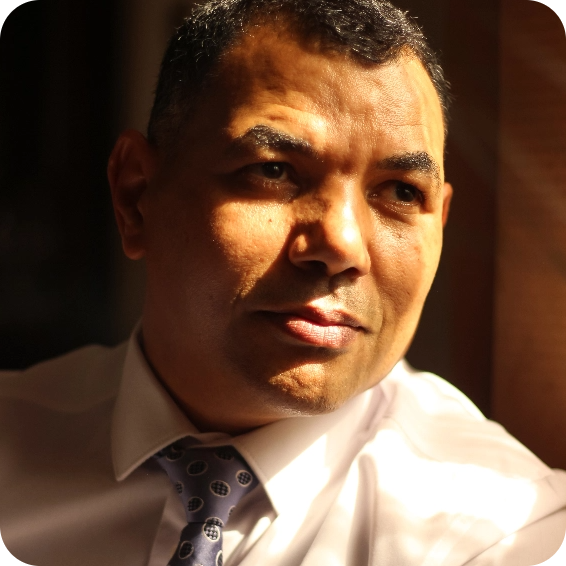Biography

Emad Abdul-Latif is a professor of Rhetoric and Discourse Analysis at Qatar University. Professor Abdul-Latif, who studied at Cairo University (Egypt) and Lancaster University (England), held positions as a visiting researcher at the University of Cambridge and the University of Tokyo. He also taught at Cairo University and the American University in Cairo.
Abdul-Latif received his PhD in Arabic Rhetoric and Literary Criticism from the Faculty of Arts, Cairo University, under joint supervision of the Department of Linguistics and English Language in Lancaster University. His dissertation, “Political Rhetoric: Analyzing Selected Speeches of the Egyptian President Sadat (1970-1981)”, won Cairo University prize for the best PhD dissertation in 2009.
Abdul-Latif established a new research trend in Arab academia, which is called “Balāghat al-Jumhūr” and translated into English as “Audience Rhetorical Empowerment.” Indeed, Audience Rhetorical Empowerment (ARE) represents now one of the most attractive areas of academic interest in modern Arabic rhetoric. This is evident in several books and articles that adopt the ARE as an analytical framework. The ARE is a field of knowledge that is concerned with audience responses to the persuasive discourses in the public sphere. It investigates the intersections of power, discourse, and audience response. Besides, the ARE explores the possibilities of developing audience’s ability to produce rational and independent responses to any given discourse, especially manipulative ones.
The foundational ideas of the ARE has been introduced, for the first time, in Abdul-Latif’s seminal article “Balāghat al-Mukhāṭab: al-Balāgha al-ʿArabiyya min ʾIntāj al-Khiṭāb al-Sulṭawī ʾilā Muqāwamatihi” (Addressee Rhetoric: Arabic Rhetoric from Producing Authoritarian Discourse to Resisting it) (2005). Later, Abdul-Latif published a book on applause in the Egyptian political contexts: “Limāthā Yuṣaffiq al-Miṣriyyūn?” (Why do Egyptians Applaud?). This book is an application of the basic ideas that have been presented in 2005’s article. After writing dozens of articles and chapters, whether by Abdul-Latif or by other scholars, the ARE became a rich field of study; it represents, now, an influential trend among Arab scholars who are interested in Rhetoric and Discourse Analysis.
Abdul-Latif’s works have a considerable influence on rhetorical scholarship in the present-day Arab academia. This influence is demonstrated by holding numerous conferences and seminars on his works and by publishing several books that benefit from his ideas.
Professor Abdul-Latif is considered an internationally acclaimed scholar in the field of Rhetoric and Discourse Analysis. His enrollment in Lancaster University gave him an opportunity to cooperate with multiple academic institutions in Europe. He was invited to give lectures and to participate in workshops at the University of Tokyo (Japan), University of Oslo (Norway), Sorbonne Université (France), and Duke University (NC, USA). In 2014, Professor Abdul-Latif was hosted as a visiting scholar at University of Cambridge (England).
He was also chosen to be a member of the editorial board of Al-ʿArabiyya: journal of the American Association of Teachers of Arabic, which is published by Georgetown University (USA). In addition, Abdul-Latif wrote several articles, chapters, and encyclopaedic entries that have been issued by distinguished publishing houses in Europe and USA, such as Oxford University Press, Routledge, John Benjamins Publishing, Leiden University Press, and Éditions L’Harmattan. Moreover, Abdul-Latif participated in research projects with European scholars and obtained funds from prominent European institutions such as The Research Council of Norway, EU’s Erasmus program, and University of Oslo.
Professor Abdul-Latif won many awards including Al-Muhajir International Award for Literature and Arts (Australia, 2011), for his article “al-Balāgha al-ʾAbawiyya fi al-Khiṭāb al-Siyasī al-ʾArabī al-Muʿāṣir” (Patriarchal Rhetoric in Contemporary Arab Political Discourse); Dubai Cultural Magazine Award (section of “Dialogue with the West”) for his study “Fī Kaifiyyat al-Ḥiwār maʿa al-Gharb: Madkhal Balāghī Tawāṣulī” (How to Dialogue with the West: A Communicative-Rhetorical Approach) (UAE, 2008-2009). His book “Balāghat al-Ḥurriyya: Maʾārik al-Khiṭāb al-Siyasī fī Zaman al-Thawra” (Rhetoric of Freedom: Battels of Political Discourse During 2011’s Egyptian Revolution) was chosen as the best book in Social Sciences, in The Cairo International Book Fair (Egypt, 2013).
